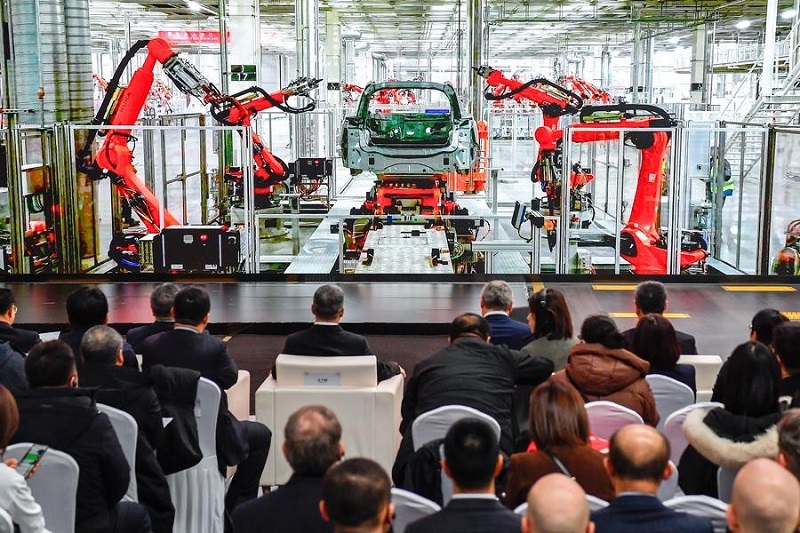As the EU gears up to vote on proposed tariffs on Chinese electric vehicles (EVs), former European Central Bank chief Mario Draghi has a different perspective. Relying on China for green products might be the EU’s cheapest path to meet its climate ambitions, he told European Parliament members on September 17. Some EU members are rethinking their China strategy, seeking feasible solutions for their differences with China and more cooperation, as indicated by Spanish Prime Minister Pedro Sanchez during his visit to China.

Cooperation is China’s choice as well. While chairing the China-EU EV Industrial Chain Enterprises Roundtable in Brussels on September 18, Chinese Commerce Minister Wang Wentao said cooperation is crucial for the development of automotive industries in China and the EU. Wang indicated that China will negotiate over the EU’s anti-subsidy probe into Chinese EVs till the last moment. He also pointed out that the tariff move will severely affect global cooperation in addressing climate change and significantly damage the multilateral trade order based on World Trade Organization rules.
China’s openness on international cooperation is also manifest in its agreements and talks with countries in other continents. China and Australia declared in a statement of their 10th Joint Committee on Science and Technology Cooperation on September 19 that the two sides will cooperate on science and technology wider and deeper.
On the same day, Pakistan’s Foreign Affairs Ministry said during a weekly media briefing that economic collaboration between Pakistan and China is fostering job creation, technological advancement, and capacity building in Pakistan. At the China International Fair for Trade in Services (CIFTIS) held in Beijing in September, Pakistani and Chinese companies signed two MoUs with a combined value of over US $350 million. The ministry said this reflected the strengthening of Pakistan-China economic relations.
Three years after President Xi Jinping proposed the Global Development Initiative (GDI) at the 76th session of the United Nations General Assembly, the initiative has won the support and participation of more than 100 countries and international organizations, including the UN itself. Moreover, over 80 countries have joined the Group of Friends of the GDI. China will deepen cooperation with others on the GDI, continue to share the development opportunities brought by its modernization, and accelerate the implementation of the UN 2030 Agenda for Sustainable Development, the Chinese Foreign Ministry said on September 20. As of now, the Global Development and South-South Cooperation Fund set up by China has supported over 150 projects worldwide.
South-south cooperation was further enhanced at the 2024 Summit of the Forum on China-Africa Cooperation in early September with Xi proposing that bilateral relations between China and all African countries it has diplomatic ties with be elevated to the level of strategic relations, and China-Africa relations be characterized as an all-weather China-Africa community with a shared future for the new era. “Mutually beneficial cooperation is the sunny road to the betterment of long-term and fundamental interests of all countries,” Xi said. China will deepen cooperation with Africa in industry, agriculture, infrastructure, trade and investment, promote exemplary, high-quality Belt and Road cooperation projects, and together build a model for delivering the GDI, he added.
In the next three years, a range of cooperation projects will be carried out between China and African countries to spearhead the modernization of the Global South. China will promote a pilot zone for in-depth China-Africa economic and trade cooperation, and launch an empowerment program for small and medium-sized African enterprises. To help the continent leverage the latest round of technological revolution, China will initiate 20 digital demonstration projects there as well as 1,000 "small and beautiful" livelihood projects to help improve people’s wellbeing.
Meanwhile, China’s burgeoning market and pursuit of high-quality development are enhancing its charm to international businesses. CIFIT attracted over 450 Fortune 500 companies as well as 85 countries and international organizations. It also saw a number of achievements in fields such as digitalization, artificial intelligence and healthcare released by over 100 businesses and institutions.
China’s hi-tech manufacturing sector has become a magnet for foreign direct investment (FDI). The first seven months of 2024 saw actual FDI in this sector increase by 2.6 percentage points from 2023, highlighting the country’s efforts to foster new quality productive forces. In April, Volkswagen announced an investment of € 2.5 billion to expand its innovation hub in east China’s Anhui Province. From January to July 2024, China’s actual use of FDI exceeded RMB 500 billion.
As the People’s Republic of China (PRC) moves toward its 75th anniversary, an open China is seeking cooperation with all to advance the sustainable development of the whole world.